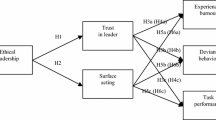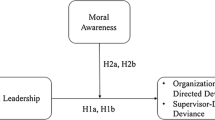Abstract
This study explores whether basic psychological needs mediate the relationships between ethical leadership on proactive behavior and deviant behavior. Therefore, this study seeks to clarify the mediating process of perceived autonomy, competence, and relatedness based on data collected from 385 full-time employees at three different times. The results showed that ethical leadership can promote employees’ proactive behavior and prevent deviant behavior, with basic psychological needs mediating the relationships of ethical leadership with proactive behavior and deviant behavior.


Similar content being viewed by others
Data availability
The raw/processed data required to reproduce these findings cannot be shared at this time as the data also forms part of an ongoing study.
References
Agarwal, U. A., Gupta, M., & Cooke, F. L. (2022). Knowledge hide and seek: Role of ethical leadership, self-enhancement and job-involvement. Journal of Business Research, 141, 770–781.
Ahmad, S., Islam, T., Sadiq, M., & Kaleem, A. (2021). Promoting green behavior through ethical leadership: A model of green human resource management and environmental knowledge. Leadership & Organization Development Journal, 42(4), 531–547.
Badrinarayanan, V., Ramachandran, I., & Madhavaram, S. (2019). Mirroring the boss: Ethical leadership, emulation intentions, and salesperson performance. Journal of Business Ethics, 159(3), 897–912.
Bakker, A. B., & Oerlemans, W. G. (2019). Daily job crafting and momentary work engagement: A self-determination and self-regulation perspective. Journal of Vocational Behavior, 112, 417–430.
Belschak, F. D., & Den Hartog, D. N. (2010). Pro-self, prosocial, and pro-organizational foci of proactive behaviour: Differential antecedents and consequences. Journal of Occupational and Organizational Psychology, 83(2), 475–498.
Bennett, R. J., & Robinson, S. L. (2000). Development of a measure of workplace deviance. Journal of Applied Psychology, 85(3), 349.
Brown, M. E., Treviño, L. K., & Harrison, D. A. (2005). Ethical leadership: A social learning perspective for construct development and testing. Organizational Behavior and Human Decision Processes, 97(2), 117–134.
Crant, J. M. (2000). Proactive behavior in organizations. Journal of Management, 26(3), 435–462.
Deci, E. L., & Ryan, R. M. (2000). The" what" and" why" of goal pursuits: Human needs and the self-determination of behavior. Psychological Inquiry, 11(4), 227–268.
Edwards, J. R., & Lambert, L. S. (2007). Methods for integrating moderation and mediation: A general analytical framework using moderated path analysis. Psychological Methods, 12(1), 1–22.
Feng, J., Zhang, Y., Liu, X., Zhang, L., & Han, X. (2018). Just the right amount of ethics inspires creativity: A cross-level investigation of ethical leadership, intrinsic motivation, and employee creativity. Journal of Business Ethics, 153, 645–658.
Ho, S. S., Li, A. Y., Tam, K., & Zhang, F. (2015). CEO gender, ethical leadership, and accounting conservatism. Journal of Business Ethics, 127, 351–370.
Hoch, J. E., Bommer, W. H., Dulebohn, J. H., & Wu, D. (2018). Do ethical, authentic, and servant leadership explain variance above and beyond transformational leadership? A meta-analysis. Journal of Management, 44(2), 501–529.
Khokhar, A. M., & Zia-ur-Rehman, M. (2017). Linking ethical leadership to employees’ performance: Mediating role of organizational citizenship behavior and counterproductive work behavior. Pakistan Journal of Commerce and Social Sciences (PJCSS), 11(1), 222–251.
Kristof-Brown, A. L., Jansen, K. J., & Colbert, A. E. (2002). A policy-capturing study of the simultaneous effects of fit with jobs, groups, and organizations. Journal of Applied Psychology, 87(5), 985.
Lin, C. P., & Liu, M. L. (2017). Examining the effects of corporate social responsibility and ethical leadership on turnover intention. Personnel Review, 46(3), 526–550.
Messmann, G., Evers, A., & Kreijns, K. (2022). The role of basic psychological needs satisfaction in the relationship between transformational leadership and innovative work behavior. Human Resource Development Quarterly, 33(1), 29–45.
Mo, S., & Shi, J. (2017). Linking ethical leadership to employee burnout, workplace deviance and performance: Testing the mediating roles of trust in leader and surface acting. Journal of Business Ethics, 144, 293–303.
Newman, A., & Sheikh, A. Z. (2012). Organizational rewards and employee commitment: A Chinese study. Journal of Managerial Psychology, 27(1), 71–89.
Ouakouak, M. L., Zaitouni, M. G., & Arya, B. (2020). Ethical leadership, emotional leadership, and quitting intentions in public organizations: Does employee motivation play a role? Leadership & Organization Development Journal, 41(2), 257–279.
Podsakoff, P. M., & Organ, D. W. (1986). Self-reports in organizational research: Problems and prospects. Journal of Management, 12(4), 531–544.
Robinson, S. L., & Bennett, R. J. (1995). A typology of deviant workplace behaviors: A multidimensional scaling study. Academy of Management Journal, 38(2), 555–572.
Ryan, R. M., & Deci, E. L. (2022). Self-determination theory. Encyclopedia of quality of life and well-being research (pp. 1–7). Springer International Publishing.
Sağnak, M. (2017). Ethical leadership and teachers’ voice behavior: The mediating roles of ethical culture and psychological safety. Educational Sciences: Theory & Practice, 17(4).
Shareef, R. A., & Atan, T. (2019). The influence of ethical leadership on academic employees’ organizational citizenship behavior and turnover intention. Management Decision., 57(3), 583–605. https://doi.org/10.1108/MD-08-2017-0721
Spector, P. E., & Fox, S. (2010). Counterproductive work behavior and organisational citizenship behavior: Are they opposite forms of active behavior? Applied Psychology, 59(1), 21–39.
Tofighi, D., & MacKinnon, D. P. (2011). RMediation: An R package for mediation analysis confidence intervals. Behavior Research Methods, 43(3), 692–700.
Tsai, H. Y. (2022). Exploring missing links between ethical leadership and multidimensional work behavior: the mediating role of multidimensional psychological ownership. Ethics & Behavior, 32((8)1-11), 729–739. https://doi.org/10.1080/10508422.2021.2018319
Tsai, H. Y. (2023). Ethical leadership influences proactive and unethical behavior: the perspective of person-environment fit. Ethics & Behavior, 1–12.
Van den Broeck, A., Vansteenkiste, M., De Witte, H., Soenens, B., & Lens, W. (2010). Capturing autonomy, competence, and relatedness at work: Construction and initial validation of the Work-related Basic Need Satisfaction scale. Journal of Occupational and Organizational Psychology, 83(4), 981–1002.
Vullinghs, J. T., De Hoogh, A. H., Den Hartog, D. N., & Boon, C. (2020). Ethical and passive leadership and their joint relationships with burnout via role clarity and role overload. Journal of Business Ethics, 165, 719–733.
Walumbwa, F. O., & Schaubroeck, J. (2009). Leader personality traits and employee voice behavior: Mediating roles of ethical leadership and work group psychological safety. Journal of Applied Psychology, 94(5), 1275–1286.
Walumbwa, F. O., Avolio, B. J., Gardner, W. L., Wernsing, T. S., & Peterson, S. J. (2008). Authentic leadership: Development and validation of a theory-based measure. Journal of Management, 34(1), 89–126.
Walumbwa, F. O., Mayer, D. M., Wang, P., Wang, H., Workman, K., & Christensen, A. L. (2011). Linking ethical leadership to employee performance: The roles of leader–member exchange, self-efficacy, and organizational identification. Organizational Behavior and Human Decision Processes, 115(2), 204–213.
Wang, M., Zhan, Y. J., McCune, E., & Truxillo, D. (2011). Understanding newcomers’ adaptability and work-related outcomes: Testing the mediating roles of perceived P-E fit variables. Personnel Psychology, 64(1), 163–189.
Author information
Authors and Affiliations
Corresponding author
Ethics declarations
Informed consent
Informed consent was obtained from all individual participants included in the study.
Research involving human participants and/or animals
All research procedures involving human participants were in accordance with the ethical standards of the research committee at the third author’s institution and with the 1964 Helsinki Declaration and its later amendments or comparable ethical standards.
Conflict of interest
The authors declare that they have no conflict of interest.
Additional information
Publisher's note
Springer Nature remains neutral with regard to jurisdictional claims in published maps and institutional affiliations.
Supplementary Information
Below is the link to the electronic supplementary material.
Rights and permissions
Springer Nature or its licensor (e.g. a society or other partner) holds exclusive rights to this article under a publishing agreement with the author(s) or other rightsholder(s); author self-archiving of the accepted manuscript version of this article is solely governed by the terms of such publishing agreement and applicable law.
About this article
Cite this article
Tsai, HY. How does ethical leadership lead to work active employees? The perspective of self-determination theory. Curr Psychol 43, 14668–14675 (2024). https://doi.org/10.1007/s12144-023-05462-8
Accepted:
Published:
Issue Date:
DOI: https://doi.org/10.1007/s12144-023-05462-8




